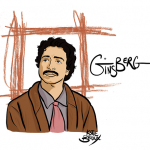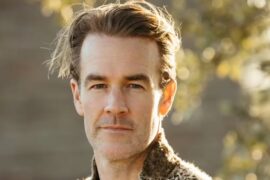HBO Canada has been rerunning The Sopranos lately and I have found myself drawn right back in to episodes I have seen two, three, four times already.
The main reason? James Gandolfini. His performance as Tony Soprano remains one of the great achievements in television.
News of his sudden death–I learned in a car getting picked up at the Wilmington, North Carolina airport Wednesday night–seems unreal. Gandolfini seemed like an indestructible force.
Except perhaps at Television Critics Association press tours. Gandolfini always seemed uncomfortable at press gatherings. The Sopranos was such a phenomenon a dozen years ago and the cast and creator David Chase were mobbed during and after each session.
Gandolfini, however, was the big get. I remember once being in a deep scrum where we had him surrounded and pinned against a wall at the Ritz Carlton in Pasadena. He was a big bear of a man, but still sweat was pouring off of him.
Yet he was always soft spoken, polite, a careful listener. It was like watching a coach work a press conference after his team lost the Stanley Cup. He didn’t want to be there, yet he patiently answered every question. You’d see the odd flash of humour, too.
His lack of enthusiasm for press gatherings did not seem to stem from any kind of a star act. It seemed more about humility, about unease in the spotlight when he was surrounded by other terrific actors.
When the TCA voted him the Best Dramatic Actor at our annual awards, Gandolfini did something I don’t think I ever saw before; he had a note sent to each and every member of the association thanking them for the honor. Ian McShane did it as well one year when he singled him out for Deadwood, but Gandolfini set the bar high among actors for graciousness.
Six years and a little over a week ago, Gandolfini’s last performance as Tony Soprano shocked viewers across North America. I remember it well. I had been invited that June of 2007 to be a moderator at the Banff TV fest. For some reason, the Canadian network carrying the series–The Movie Network in those days before HBO Canada–sent me a screener of the finale. I did not watch it ahead of time, but boarded a plane for Alberta with the disc in my jacket pocket.
When I got to the beautiful Banff Springs hotel, I found out they did not have HBO or TMN and that–incredibly for a TV festival–no Sopranos screening was scheduled for that opening night. I alerted the organizers that I had the episode, and everyone who was there that year–Chuck Lorre, showrunner Carol Mendelsohn, Bill Carter from the New York Times and dozens of TV executives and talent from both sides of the border–found their way down to a theatre-sized screening room, where we watched it at the same time it was airing on television.
When it abruptly ended, in the dark, Journey’s Don’t Stop Belivin’ suddenly silent, I was glared at by a room full of smart TV folks who thought I’d been sent an edited screener and that I’d cheated them out of the ending.
Calls were made to editors back East and I was off the hook. Tony`s end was forever left up to our imaginations. The deconstruction began immediately.
That ending is an example of art doing what life sometimes cannot. Gandolfini, dead in Rome at 51, was not how Chase would have written it.
It is no solice for his friends and family, but for fans, we’ll always have the series. Go back and look at Gandolfini near the start of Season Six, when he is shot by Uncle Junior. The bizarre, parallel fantasy world that played out the next few episodes showed a range of emotion beyond even what the actor has delivered up to that point.
Think of how Gandolfini changed things. Tony was a murderous mobster, a cold-blooded killer. Yet when he gets away, running though the woods towards his suburban home, at the end of Season Four, we are not just relieved, we are ecstatic. We want him to live. We want him to get away with all of it, to have some sort of redemption. We love the guy.
He showed up at one post-Sopranos press tour, promoting a documentary. He was one of the executive producers of Alive Day Memories: Home From Iraq. There was a party that night, and soldiers who had been terribly wounded, many losing sight or limbs or both, were guests of honour. Gandolfini quietly hung around with these folks, men and women, all severely damaged but still here, dammit. He stayed among them and gave them his full attention and respect.
Few reporters hounded him that night. The whole crazy TV business was never so soundly put in its place.
Besides, Gandolfini, for once, looked happy at a press tour. Maybe he was wounded, too, maybe he felt real war heroes should get the glory accorded TV stars–I don`t know. Maybe he was just hungry and thirsty. He just looked so relaxed, comfortable, so right at home.
Fade to black.

Next Post






